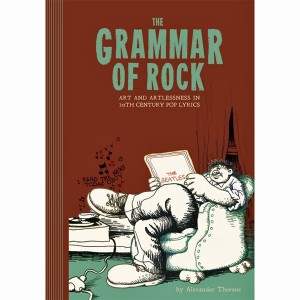Tagged: grammar of rock
Reviewed: The Grammar of Rock: Art and Artlessness in 20th Century Pop Lyrics

Popular music in America, at least over the last couple of decades, has, in my opinion, disintegrated into meaninglessness and timeliness, with lyrics that are undeniably catchy but equally as terrible and lacking in substance and philosophical fortitude. Musicians today seem to be simply trying to produce music that will sell rather than focusing on music that is of the highest quality, particularly lyrically. Older artists, such as Marvin Gaye, Simon and Garfunkel, Stevie Wonder, Michael Jackson, Fleetwood Mac, Led Zeppelin, The Who, and dozens more, had a much better sense of what to write their music around. Cliche as it sounds, kids these days just don’t possess the same level of recognition or appreciation for great music. Being quite the music fanatic myself, able to appreciate works from almost every genre, I was very interested to read what Alexander Theroux had to say about musical lyrics. Rather than taking the standpoint of an all-knowing, official, academically certified scholar whose input on 20th century music’s lyrics should be taken as matter-of-fact, Theroux wrote his book more in the form of an essay with a rather conversational, amenable voice. It is as if he was attempting to give readers a sense of what it’s like to chat with him about the topic of 20th century musical lyrics. He writes with a satirical, rough, and, at times, cruel tone that some readers may very well find off-putting. He points to many songs’ downfall in their lyrics’ grammatical flaws, topical, disorganized and unrelated subject-matter, and overall haphazardness and meaninglessness. Whether done so intentionally or not, the book itself has its fair share of grammatical and structural issues, and left me wondering what exactly his purpose was for writing it.
For a book whose title, I’m sure, intrigues a large percentage of both music and book lovers, The Grammar of Rock: Art and Artlessness in 20th Century Pop Lyrics may start off solidly, but ultimately is very poorly written and organized, shallow and pedantic. The idea of analyzing song lyrics as a form of literature is a very interesting one, but one that Theroux is never able to explore fully or fairly. With such an interesting concept for a book, readers, much like I was, must’ve been chomping at the bit to get through it. Not too far in, it became a rather painful and distasteful experience, and one that I wanted to end immediately. It is clear from reading that the author is a wise man with some interesting ideas dispersed throughout, however the book fails to satisfy what readers were hoping it would – an interest in the evolution and explication of musical lyrics and analyses of songs as pieces of literature. A mere 40 pages in (out of the book’s 350 pages total), the author had portrayed himself as a cynical, old, out-of-touch writer whose curbed opinions should be taken as matter-of-fact. There is no doubt a quirkiness to his writing, which he seems to feel allows him to spew unfounded criticism in the form of jabs and jokes at not only the musical artists, but also the fans of such music. Theroux writes in a manner that can be described as arrogant, pompous, autocratic, and misguided as he attacks seemingly the whole population of poorly educated Americans who appreciate music for all the wrong reasons.
Theroux does make some valid arguments, pointing to music’s tendency to disregard proper grammar, pronunciation, and dialect, however fails to realize that doing so is often necessary in order for musical artists to maintain appropriate rhyme and meter, much like what poets must often do. His inability to permit any sort of dialectic imprecision inhibits him from being able to appreciate music for what it’s worth. One example of this that I loved was his ability to “permit” song titles and lyrics such as Billy Paul’s “Me and Mrs. Jones,” alluding to the fact that while “Mrs. Jones and I” would be the grammatically correct form, it would not have the same “backstreet sordidness” of the original song’s title and lyric. I was certainly able to appreciate the humor he includes within his analyses, whether done so intentionally or not, as it helps to lighten the mood and soften the rigid strictness of most of the book. While allowing certain permissions, such as “Me and Mrs. Jones,” Theroux seems unable to help himself from spending several pages condemning grammatical blunders and misusages, incongruities, contradictions, and improperly used expressions or phrases. I certainly don’t believe, after reading his book, that Theroux intended coming off as so pompous that it’s humorous, but that is absolutely the feeling I was left with and am thus able to appreciate the work, if for no other reason than that.
